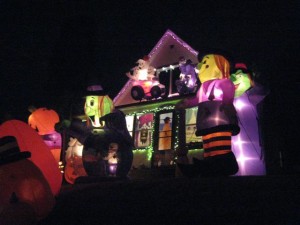Happy Halloween!
I was truly surprised when I went to work in the care center today. Each department came up with some elaborate decorations and costumes.

Back in June or July (I’m not kidding), during one of department’s monthly planning meetings, one of the coordinators mentioned Halloween. The director of our department is new and hasn’t been here for a whole year; he was not aware of the complexity that Halloween apparently involves. According to that particular unit coordinator, many departments had already begun planning their themes and performances (!) for Halloween. Again, this was in mid-summer.
I love Halloween. So I got all into it when one of the suggested themes was “cops and robbers.” I changed it to “cops and convicts” because I like the alliteration, and immediately decided that half of the department could be cops, searching out the convicts.
I wrote up short scripts for coordinators who were cops and those who were convicts. The day included “pass-bys,” where one or the other coordinator spotted the other and staged a chase through the halls, thereby involving all of the residents in sight and earshot. We took mug shots of the convicts, and showed them to residents to help the cops seek out those pictured. We prepared a song and even created a jail for this portion of the day where all of the departments’ themes were judged.
We did pretty well. I thought the whole thing was pretty fun.

We did not win, though. We didn’t even get second place. Not even the department whose theme was “Clue,” and who dedicated different offices and conference rooms to the various spaces in the movie, won or took second. The winner was an Egyptian theme, but I don’t know what their shtick was. Or how they engaged the residents.
Seems that I don’t like losing. But I love Halloween.


